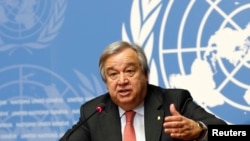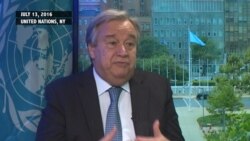The U.N. Security Council has formally endorsed Portugal’s former prime minister Antonio Guterres as the next U.N. Secretary-General.
Following a decisive round of voting Wednesday in the council, the veteran politician and diplomat prevailed with 13 votes in favor of his candidacy, none objecting and two votes of “no opinion.”
In the formal vote Thursday, the council approved him by acclamation, adopting a resolution recommending him to the General Assembly, which will pro forma approve his nomination next week.
Guterres was not present in New York for the vote, but he spoke briefly in Lisbon saying he feels humbled and grateful that he has been selected.
"Gratitude, but also humility when facing dramatic problems of today’s world. Humility that is needed to serve," he said. "Especially to serve those that are most vulnerable, the victims of conflict, of terrorism, the victims of the violation of rights. The victims of poverty and the injustices of this world."
He noted the quick agreement around his nomination in a Security Council not lately known for its unity.
"I hope this represents a symbolic moment, a moment in which the Security Council enhances its capacity to act in unity and consensus creating the conditions to decide timely in relation to the dramatic problems of our time," Guterres said.
WATCH: Guterres on his vision for role of UN chief
Praise for Guterres
“He’s a high level politician. He’s been prime minister of his country. He is a person who talks to everybody, listens to everybody, speaks his mind; very outgoing, I think open person,” Russia’s U.N. Ambassador Vitaly Churkin said about Guterres. “So I think it was a great choice.”
“António Guterres has shown ... that he is the strongest candidate,” said Britain’s ambassador Matthew Rycroft. “He has a vision, and a moral authority, and integrity that have put him at the top of this league.”
Speaking to reporters in Rome, current U.N. chief Ban Ki-moon congratulated his former high commissioner for refugees.
“I know Mr. Guterres very well and consider him a superb choice,” he said. He noted that during his decade-long tenure as refugee chief he showed “a deep compassion for the millions of people who have been forced from their homes.”
The global refugee crisis will be one of the biggest challenges awaiting Guterres when he takes up his post on January 1, 2017.
Guterres, 67, was Portugal’s prime minister from 1995 to 2002. He led the U.N. Refugee Agency from 2005-2015. He is a trained theoretical physicist and an avid reader of history.
He told VOA in an interview during his campaign that he was running for the top U.N. job because he wants to “create the conditions for solutions” to global challenges.
Gender and Geography
There is a United Nations tradition of regional rotation to fill the secretary-general’s post. Eastern Europe is the only group that has never had a turn and it fielded a number of candidates this year in a bid to end that .
There was also a push by about a third of the member states to see a woman occupy the secretary-general’s suite on the 38th floor of U.N. headquarters. But despite the talk of wanting a woman, the female candidates have mostly placed only in the middle to the bottom of the pack.
“We do, however, fully expect that the new secretary-general will be a feminist secretary-general who puts women's rights and gender equality at the very core of the international agenda,” Oxfam International Executive Director Winnie Byanyima said Thursday.
Ban Ki-moon’s term expires December 31st. Guterres will take over on January 1, for an initial five-year term, with the possibility of a second five-year term.






